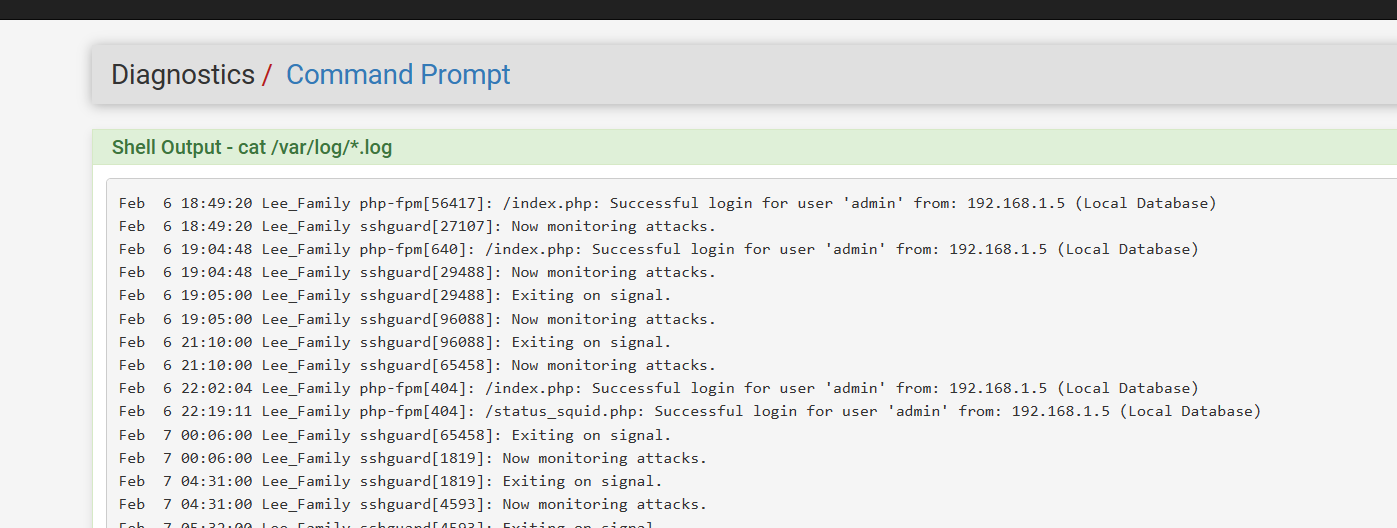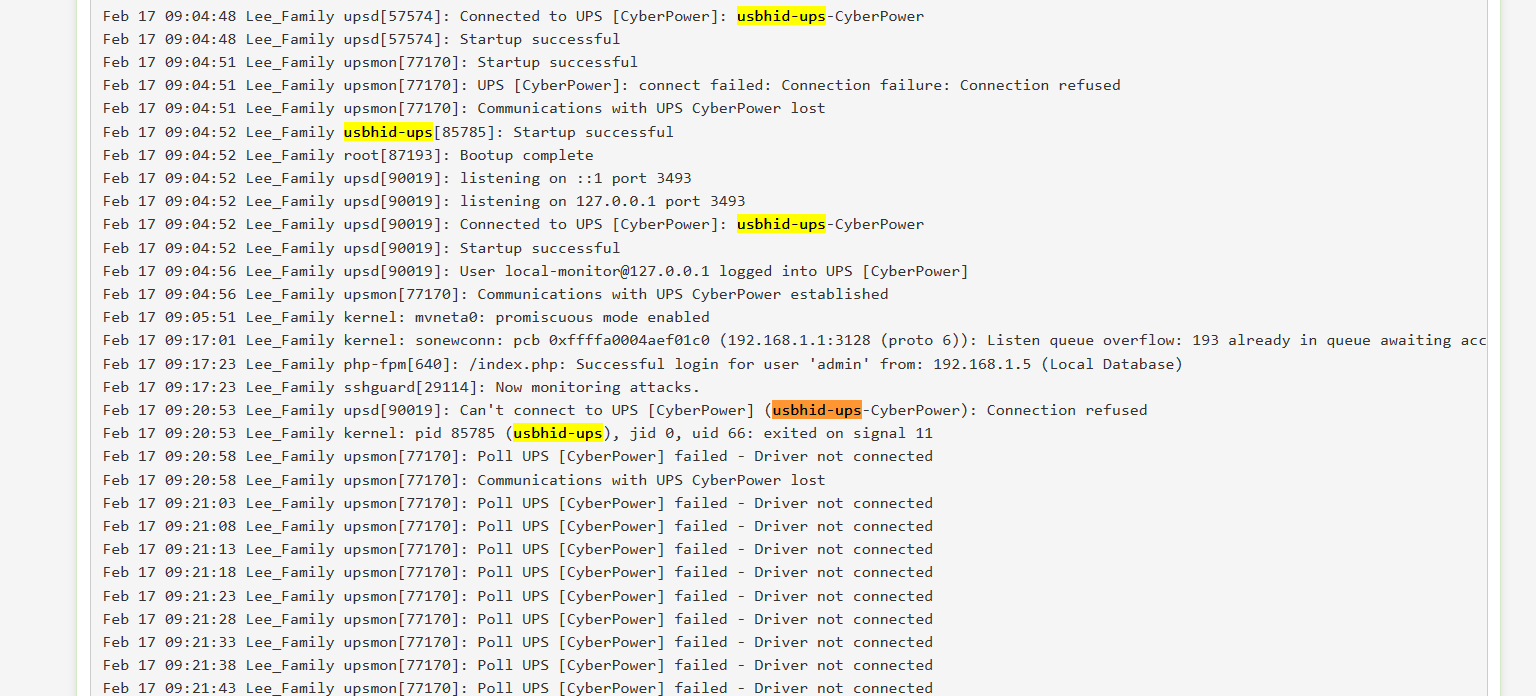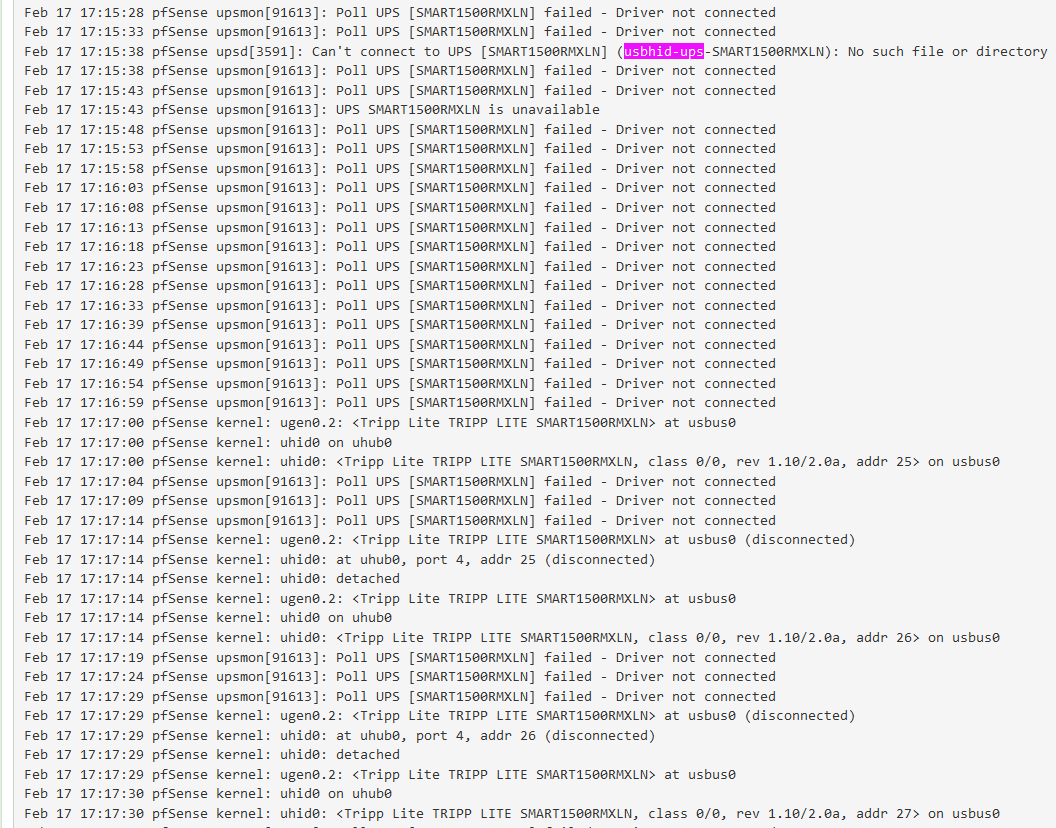-
@dennypage Thanks for looking into this so quickly. Maybe they can fix it with HLA (High Level Assembly) it is very C++ like I am learning assembly this semester, again HLA versus Intel based assembly code is very different. ARM based assembly language is also different. We are doing x86-x64 intel right now it's very cool!!
-
unfortunately, the system keeps thinking that my reply is spam and won't let me post it.
went through the instructions.
usbconfig -v gives the same before and after. UPS is attached to ugen0.2 and identified correctly - "CPS OR500LCDRM1Ua".
[23.01-RELEASE][X@Y]/var/log: cat *.log | egrep -ie usb | more
shows no errors or info that already reported in my original post.
[23.01-RELEASE][X@Y]/var/log: usbconfig -v
ugen0.1: <Intel XHCI root HUB> at usbus0, cfg=0 md=HOST spd=SUPER (5.0Gbps) pwr=SAVE (0mA)
ugen0.1.0: uhub0: <Intel XHCI root HUB, class 9/0, rev 3.00/1.00, addr 1>ugen0.2: <CPS OR500LCDRM1Ua> at usbus0, cfg=0 md=HOST spd=FULL (12Mbps) pwr=ON (2mA)
-
@shaffergr said in NUT package:
[23.01-RELEASE][X@Y]/var/log: cat *.log | egrep -ie usb | more
shows no errors or info that already reported in my original post.Thanks. Your original post contained the crucial information, which is that usbhid-ups is exiting with a bus error.
I'm assuming that the others will also see this in their logs.
Are you a C coder by chance? I don't have a CPS.
-
@azdeltawye said in NUT package:
I am experiencing the same issue with my Tripp Lite rack mount UPS; NUT not able to connect after upgrading pfSense to 23.01.
Is it the same issue? It works for several minutes and then fails? Or is the issue you are seeing that it never works?
If the former, please check your logs for usbhid-ups messages and post them.
If the latter, have you unplugged and replugged since updating? Alternatively a second reboot would work as well.
-
Its been a long time since I coded anything so most likely no help.
nut/usb package worked flawlessly under 22.05 so wonder what changed...
Can I turn the log level up to debug to gather more info?
-

(Image: Same issue)

(Image: Same issue)Feb 17 13:56:23 Lee_Family kernel: pid 53495 (usbhid-ups), jid 0, uid 66: exited on signal 11
Feb 17 09:20:53 Lee_Family kernel: pid 85785 (usbhid-ups), jid 0, uid 66: exited on signal 11
-
I am only seeing exit signal 10, not signal 11 so interesting..
-
@shaffergr I am running an ARM processor for this one
-
@azdeltawye
Run this command in the GUI
cat /var/log/*.log
After search with ctl-f usbhid-ups this should make it easy so you do not need to log in with a console cable or ssh in, and still get the log entry everyone is looking for.

Quick and easy way to find it, my grep | was not working in the command area.
-
My Bo’s is a Netgate XG-7100. Intel Atom processor so amd64
-
Box, not Bo’s
-
@shaffergr said in NUT package:
I am only seeing exit signal 10, not signal 11 so interesting.
Different sides of the same random pointer coin. One is accessing memory that doesn't exist, the other is accessing memory that exists but doing so improperly.
-
@shaffergr mine is a Netgate SG-2100 Max
-
Fingers crossed, I may have found a workaround. My CyberPower UPS has now been continuously connected for a little over 1.5 hours.
After a lot of searching, I came across this link:
https://github.com/networkupstools/nut/wiki/Troubleshooting-eventual-disconnections-(Data-stale)
I ended up setting/adjusting the following variables:
pollinterval=15in the section for ups.conf
MAXAGE 25in the section for upsd.conf
DEADTIME 25in the section for upsmon.confWill continue to monitor - hopefully it will to stay connected.
-
@tman222 said in NUT package:
Fingers crossed, I may have found a workaround. My CyberPower UPS has now been continuously connected for a little over 1.5 hours.
After a lot of searching, I came across this link:
https://github.com/networkupstools/nut/wiki/Troubleshooting-eventual-disconnections-(Data-stale)
I ended up setting/adjusting the following variables:
pollinterval=15in the section for ups.conf
MAXAGE 25in the section for upsd.conf
DEADTIME 25in the section for upsmon.confWill continue to monitor - hopefully it will to stay connected.
Well, I spoke too soon - shortly after posting this the connection was lost again with the same signal 10 kernel error shown in the logs that has already been referenced above.
Would another temporary workaround be just to set up a cron job to restart nut every e.g. 15min until a more permanent solution is found?
-
-
@dennypage I removed the package for now, it is generating tons of logs that I can't see anything else in the GUI logs. It seems to be consuming more resources than normal also with the pointer issues. Will reinstall once we have a solid resolve for this issue.
-
@azdeltawye is that the only entry ?
-
I guess my symptoms are different in that it never works at all. Yes, I have unplugged and rebooted several times without any improvement.
I did run the 'usbconfig -v' command and it appears normal?:
ugen0.1: <Intel XHCI root HUB> at usbus0, cfg=0 md=HOST spd=SUPER (5.0Gbps) pwr=SAVE (0mA) ugen0.1.0: uhub0: <Intel XHCI root HUB, class 9/0, rev 3.00/1.00, addr 1> bLength = 0x0012 bDescriptorType = 0x0001 bcdUSB = 0x0300 bDeviceClass = 0x0009 <HUB> bDeviceSubClass = 0x0000 bDeviceProtocol = 0x0003 bMaxPacketSize0 = 0x0009 idVendor = 0x0000 idProduct = 0x0000 bcdDevice = 0x0100 iManufacturer = 0x0001 <Intel> iProduct = 0x0002 <XHCI root HUB> iSerialNumber = 0x0000 <no string> bNumConfigurations = 0x0001 Configuration index 0 bLength = 0x0009 bDescriptorType = 0x0002 wTotalLength = 0x001f bNumInterfaces = 0x0001 bConfigurationValue = 0x0001 iConfiguration = 0x0000 <no string> bmAttributes = 0x0040 bMaxPower = 0x0000 Interface 0 bLength = 0x0009 bDescriptorType = 0x0004 bInterfaceNumber = 0x0000 bAlternateSetting = 0x0000 bNumEndpoints = 0x0001 bInterfaceClass = 0x0009 <HUB> bInterfaceSubClass = 0x0000 bInterfaceProtocol = 0x0000 iInterface = 0x0000 <no string> Endpoint 0 bLength = 0x0007 bDescriptorType = 0x0005 bEndpointAddress = 0x0081 <IN> bmAttributes = 0x0003 <INTERRUPT> wMaxPacketSize = 0x0002 bInterval = 0x00ff bRefresh = 0x0000 bSynchAddress = 0x0000 Additional Descriptor bLength = 0x06 bDescriptorType = 0x30 bDescriptorSubType = 0x00 RAW dump: 0x00 | 0x06, 0x30, 0x00, 0x00, 0x00, 0x00 ugen0.2: <Tripp Lite TRIPP LITE SMART1500RMXLN> at usbus0, cfg=0 md=HOST spd=LOW (1.5Mbps) pwr=ON (0mA) ugen0.2.0: uhid0: <Tripp Lite TRIPP LITE SMART1500RMXLN, class 0/0, rev 1.10/2.0a, addr 29> bLength = 0x0012 bDescriptorType = 0x0001 bcdUSB = 0x0110 bDeviceClass = 0x0000 <Probed by interface class> bDeviceSubClass = 0x0000 bDeviceProtocol = 0x0000 bMaxPacketSize0 = 0x0008 idVendor = 0x09ae idProduct = 0x3015 bcdDevice = 0x020a iManufacturer = 0x0002 <Tripp Lite > iProduct = 0x0003 <TRIPP LITE SMART1500RMXLN > iSerialNumber = 0x0004 <2517AY0SM882400090> bNumConfigurations = 0x0001 Configuration index 0 bLength = 0x0009 bDescriptorType = 0x0002 wTotalLength = 0x0022 bNumInterfaces = 0x0001 bConfigurationValue = 0x0001 iConfiguration = 0x0000 <no string> bmAttributes = 0x00e0 bMaxPower = 0x0000 Interface 0 bLength = 0x0009 bDescriptorType = 0x0004 bInterfaceNumber = 0x0000 bAlternateSetting = 0x0000 bNumEndpoints = 0x0001 bInterfaceClass = 0x0003 <HID device> bInterfaceSubClass = 0x0000 bInterfaceProtocol = 0x0000 iInterface = 0x0000 <no string> Additional Descriptor bLength = 0x09 bDescriptorType = 0x21 bDescriptorSubType = 0x10 RAW dump: 0x00 | 0x09, 0x21, 0x10, 0x01, 0x00, 0x01, 0x22, 0xe4, 0x08 | 0x04 Endpoint 0 bLength = 0x0007 bDescriptorType = 0x0005 bEndpointAddress = 0x0081 <IN> bmAttributes = 0x0003 <INTERRUPT> wMaxPacketSize = 0x0008 bInterval = 0x0028 bRefresh = 0x0000 bSynchAddress = 0x0000 -
@jonathanlee said in NUT package:
@azdeltawye is that the only entry ?
It seems to repeat that sequence over and over.
Copyright 2025 Rubicon Communications LLC (Netgate). All rights reserved.
